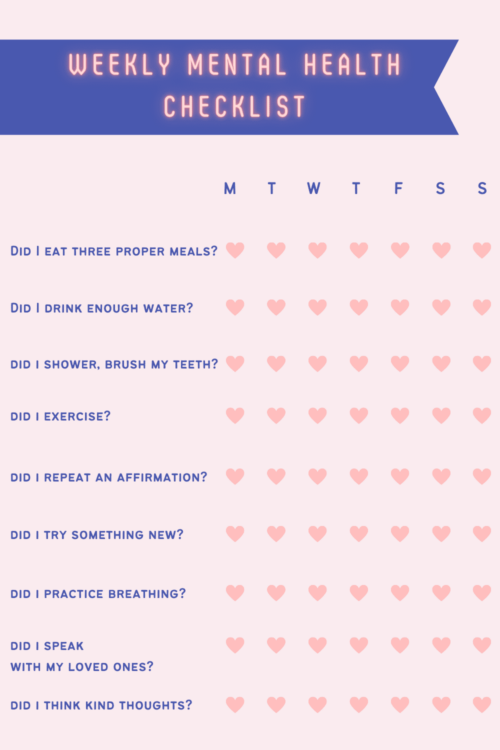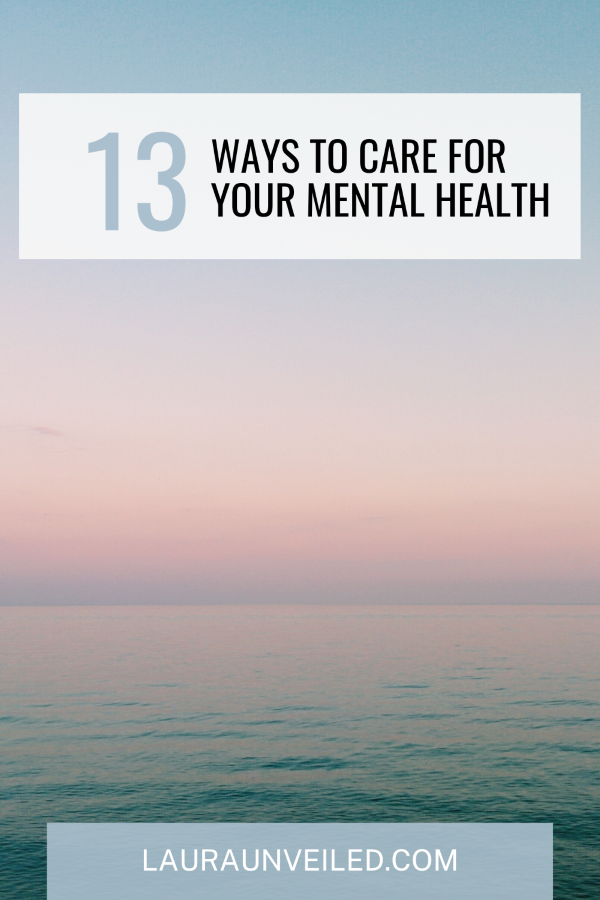How to take care of your mental health when you’re struggling
Mental health isn’t just as important as physical health. Mental health IS physical health.
Physical pain can be caused by the physical effects of your mental health illness. Just like you go to the doctor if you have a toothache, you should take action if you feel mentally down.
That’s why I decided to write a post about how to take care of your mental health.
I’m not a professional, but I’m a naturally anxious person, so all of my advice is based on my own experiences. Don’t be afraid to seek professional help when needed!

This post may contain affiliate links. That means that if you click on a link and purchase something I recommend, I will receive a small commission at no extra cost to you.
What can you do to improve your mental well-being?
1. Weekly Mental Health Checklist
The first thing on my daily list is a mental health checklist.
You might look at it and think you don’t need it, but I really suggest you print it out or save it so that you can check on yourself every day.
I came up with this checklist to make sure my basic needs are satisfied every day. I’m not saying it will help you avoid mental illnesses, but it will certainly keep you in the present.
There are 10 questions that you can ask yourself every night before going to bed to make sure you’ve done everything to take care of your mental health.
If you miss something (and sometimes it happens), keep reminding yourself that you’re a worthy person and not all days are the same.
The main purpose of this checklist is to assure yourself of how much you’ve really accomplished, not to criticize yourself.
Ask yourself:
- Did I eat three proper meals?
- Did I drink enough water?
- Did I shower and brush my teeth (twice)?
- Did I spend time in the fresh air?
- Did I exercise?
- Did I repeat a chosen affirmation?
- Did I try something new?
- Did I practice breathing?
- Did I speak with my loved ones?
- Did I think kind thoughts?

2. Practice self-care
The main thing you should try to keep in mind while trying to take care of your mental health is practicing self-care. Self-care means taking time to do the things you love for yourself.
I’ve become really good at spending time with myself, so here are some of my favorite ideas:
- Take a bubble bath.
- Go for a walk or a run, and listen to a motivational podcast while doing so.
- Take a nap.
- Try some self-love day activities.
- Write a bucket list, gratitude list, or mood board.
- Adult coloring books (those are so fun!). This mandalas coloring book, this anxiety coloring book, and this good vibes coloring book are the absolute favorites that I would recommend to everyone.
- Light a candle and draw something while listening to your favorite music. Remember, you don’t have to be artsy to draw something. Art is in the eye of the beholder. My favorite candle is this scented candle. It smells so good, and it lasts for such a long time.
- Try photographing yourself in a professional way.
- Watch something funny that makes you laugh. Laughing is a proven way to reduce stress levels.
- Create a playlist of mood-boosting songs and listen to it every time you’re feeling low.
- Go through your e-mails, delete the ones you don’t need, and unsubscribe from all unnecessary lists.
3. Daily journaling
Journaling helps us improve both our mental health and our memory. Writing down our thoughts and worries can make them feel less concerning to us.
Write down everything that worries you and create a step-by-step plan on how to overcome these problems. Remember, your thoughts are not facts, so they can be changed.
Write down everything you achieved this day and your goals for the following day. I also like planning out my next day since I know it increases my productivity dramatically.
Create a list of the things you’re thankful for. Practicing gratitude helps you realize how much you really have.
Remember, positive thoughts bring more positive things into your life, and negative thoughts attract negative things.

4. Exercise
Physical exercise reduces stress and improves self-esteem. Exercising releases serotonin and endorphins, and your brain really likes those.
Taking care of your body by exercising doesn’t mean you have to do an intense workout.
It should be something you enjoy and doesn’t make you feel obliged, whether it’s working out in the gym, doing yoga, or even some light walking.
For my workouts, I use these resistance bands and this extra-thick yoga mat.
I really love Blogilates’ workouts. They are not too intense, and even I, as a super-duper beginner, can keep up with them.
She makes videos that focus on different parts of the body, so everybody can create their own workout routine/playlist that’s suitable for their needs. There’s something for everyone!
5. Don’t forget to eat, drink and sleep properly
Eat the rainbow, as they say. Food fuels your soul. Essential nutrients are important to keep your nervous system functioning.
Skipping meals causes hypoglycemia, and you can end up feeling irritated, dizzy, and weak.
It’s proven that drinking water is important for maintaining your mental health. Among many other benefits, consuming water is also good for your skin and hair.
Proper sleep is crucial for maintaining good mental health. It’s like a dead circle because mental health problems can have a negative impact on our sleep, and poor sleep can affect our mental health.
Make sure that you get at least 8 hours of uninterrupted sleep, and if you feel tired during the day, don’t be afraid to take a small nap if necessary.
6. Practice breathing
Take deep breaths. Focusing your attention on inhaling and exhaling helps to relax you and bring you back to the present.
It happens quite often that we forget how to breathe properly, and this can increase carbon dioxide levels in our blood, which will then affect our overall well-being.
If you don’t know where to start, try these different breathing exercises.
Meditating (don’t forget to light a good-smelling candle!) makes us relaxed as well, because meditation means taking the time to be silent and mindful, letting your brain relax while striving for inner peace.

7. Reduce your screen time and read more books instead
Limit your news and social media intake.
I’m not saying you have to uninstall Facebook completely, but make some changes to how much time you spend on social media and how you do that.
Every time I feel like grabbing my phone to check social media, I try to read a book instead because, unlike social media, books really provide value and even inspire us.
If you’re not a fan of paper books, that’s fine. You can always try listening to an audiobook or reading an e-book.
8. Develop a routine and stick to it
Developing a routine is a great way to take care of your mental health because it can help with managing your time, preventing procrastination, and finding the motivation to do things.
I have created both morning and nighttime routines for myself. I also schedule my day to increase my productivity, which means that I write down everything that needs to be done that day.
I usually wake up at 6 AM, drink a glass of water, and then stretch for a few minutes. I read my e-mails, meditate for 5–10 minutes, make myself some coffee, and start working.
Some people like to plan their day in the morning, but I’ve found that planning my day the night before is more suitable for me, as I’m not really a morning person.
9. Step out of your comfort zone and try something new
Every day, try to do things that nourish and challenge your brain and expand your knowledge. Set new, even unrealistic goals, visualize them, and don’t be afraid to reach them.
I’ve only recently started my blog, but I’ve promised myself that within three years, I’ll be able to quit my job and make money from it. They say that the sky’s the limit, and I believe it to be true.
How can trying something new improve your mental health?
Well, learning new things and achieving your goals can help you improve your self-esteem because humans are curious creatures, and the more knowledge we gain, the better we feel about ourselves.

10. Reach out to someone
We, as humans, are meant to be social. The world is divided into introverts and extroverts, but what we all have in common is the need for connection.
Besides journaling, talk to a friend, a family member, a loved one, or a therapist about how you feel.
Caring for your mental health also means that you should not be afraid to ask for help when needed.
11. Reduce negativity and let go of expectations
Be mindful of your emotions. Take care of your mental health by checking in with yourself every now and then. Ask yourself:
- “How am I feeling?”
- “If I’m feeling down, then why?”
- “What would I tell someone else in the same situation?”
Your thoughts and environment play a huge role in how you feel. I know how easy it is to spiral, keep doubting yourself, and think negative thoughts.
It’s a bad habit of mine that I’m still struggling to ditch. Don’t forget—your thoughts are not facts. They can be changed.
If you live in a negative environment, it will have a negative impact on everything in your life. We are surrounded by expectations that are not our own.
Expectations prevent us from reaching our full potential. We can achieve whatever we set our minds to; we just need to visualize them and believe hard enough.
Social media plays a huge role in this negativity. Don’t get me wrong, social media has a lot of upsides too. Social media has given many of us a voice in places where we wouldn’t be heard otherwise.
Media platforms can be used for noble activities such as charities and fundraising. Social media can even improve our mental health because it helps to relieve social isolation.
I can’t stress this enough: follow only people who make you feel good and add value to your life. Unfollow everyone who makes you feel like you’re not enough.
I want you to do it now. Pause reading this post and go unfollow everyone who makes you feel unworthy because you don’t deserve it!
Instead of watching reality shows, watch positive and inspirational movies or documentaries that help you see the positive things in life.

12. Develop a process for dealing with negative thoughts and feelings
Don’t ignore your anxiety, as it will only make things worse. I think everyone experiences anxiety at one time or another, so it’s nothing to be ashamed of.
Think about the things that make you angry. Try to stay away from these things.
I, for example, know that since I struggle with my skin, perfect and photoshopped Instagram photos trigger me, so I avoid those, and I keep repeating to myself every day that I’m worthy and beautiful no matter what.
Think about the things that improve your mood. Try to implement those things every day. I’m a huge fan of alpacas, so watching alpaca videos always makes me super happy.
Find your own alpaca videos and watch them every time you’re feeling low.
Be kind to yourself, and I really mean it. Would you talk to others the way you talk to yourself? Don’t be too harsh on yourself. Keep in mind that you are doing the best you can.
Another way to care for your mental health is by repeating affirmations. The more you believe in something, the more likely it will happen.
13. Learn everything about happiness chemicals and try to increase those levels
There are four main happiness chemicals named serotonin, oxytocin, dopamine, and endorphin. Each of them has an impact on your happiness.
Basically, all the things you can do to increase your happiness levels naturally are FREE!
Serotonin
Serotonin is the key hormone that is responsible for our mood, feelings, and happiness. It impacts our entire body. Serotonin helps with regular appetite, bowel movements, and sleeping.
When your serotonin levels are normal, you should be emotionally stable, calm, and happy.
The lack of serotonin can improve everything from the quality of our sleep to our appetite. However, too much serotonin can result in excessive nerve cell activity.
How to increase serotonin naturally?
Food. You can’t get serotonin from the food itself, but you can get tryptophan, which is an amino acid that your brain will synthesize into serotonin.
Want to know which foods contain tryptophan and therefore boost your serotonin levels?
Eggs, spinach, cheese, soy products, turkey, salmon, pineapple, nuts, and seeds are among the many options.
Exercise. Exercise triggers the release of serotonin in our bodies. Every kind of exercise is good, but aerobic exercise seems to have the biggest impact on our serotonin levels.
Go outside. Our serotonin levels seem to be lower during the winter and higher during the summer, and it all has to do with exposure to bright light.
Spend some time outside and enjoy the sunshine for at least 10 to 15 minutes a day to increase your serotonin levels. Don’t forget to wear sunscreen!
Get a massage. Massage helps to increase both serotonin and dopamine levels. It also decreases cortisol, which is basically a stress hormone.
What you can do is take a friend, family member, or loved one and do massage swaps for 20–30 minutes each.

Oxytocin
Oxytocin is known as the “love chemical.” It helps us feel loved, connect to other people, trust, and be psychologically stable.
Oxytocin also plays a huge role in reproduction and motherhood.
The lack of oxytocin makes us feel less good about ourselves than we normally would, and we feel less connected to other people.
It’s important to know that this hormone doesn’t change your behavior itself, which means it won’t make you fall in love instantly, for example, but it will boost your positive feelings for someone you already love or care about.
How to increase oxytocin naturally?
Listen to music. Music improves our mood for a reason. Research has shown that listening to good music or even making your own music helps boost your oxytocin levels. Increased oxytocin levels equal a happier you.
Get a massage. Getting a massage is beneficial for many reasons. Just like I mentioned before, yes, it increases your serotonin levels, but also your oxytocin levels.
People report feeling more relaxed after a 15-minute massage session. I mean, who doesn’t love getting a massage?
Share love. Research shows that showing your love and feelings toward your loved ones increases your oxytocin levels because they will either respond the same way (meaning your body will produce oxytocin) or you will end up hugging or kissing the other person (meaning your body will produce oxytocin).
Meditate. So, we know that our oxytocin levels rise when we share love or even think about our loved ones. But you can also produce oxytocin by meditating about your loved ones.
While meditating, send love and good thoughts toward someone you love.
Hang out with your friends, family, or significant other. If you hang out with people you love, it will make you feel supported and less lonely.
The people around you who make you feel good have a huge role in increasing your oxytocin levels.
Preparing a meal with someone and sharing food is a great way to bond and therefore increase your oxytocin levels.
Eating also makes us feel pleasure, and our bodies will produce the pleasure hormone, oxytocin, itself.

Dopamine
Dopamine is known as a pleasure and reward chemical. When our brain releases dopamine, it motivates us to repeat a specific behavior.
It boosts our mood, motivation, productivity, and attention. The lack of dopamine might result in difficulties concentrating, poor coordination, and feeling less motivated.
How to get dopamine naturally?
Food. I did a Google search for foods to eat to increase dopamine levels, and I came across velvet beans! Velvet beans have a high level of levodopa, which is an amino acid precursor of dopamine.
Keep in mind that large quantities of velvet beans are toxic, so like always, less is more.
Eat fewer saturated fats. What are saturated fats? Saturated fats are unhealthy fats that are found in full-fat dairy products, butter, red meat, and also tropical oils (yes, even coconut oils).
Eat more protein. There are 23 different amino acids. Your body can synthesize some of them, but not all, so you need to get other amino acids from foods.
Tyrosine is an amino acid that is essential for producing dopamine. Tyrosine can be found in protein-rich foods such as fish, beef, tofu, milk, and legumes.
Why do you need to eat protein? Protein is the fundamental component of organs, muscles, skin, and hormones. Protein is important for your body because it helps it maintain and repair tissues.
Exercise. Exercise can help you feel better by boosting dopamine levels in your brain and improving your mood.
Get enough sleep. Dopamine causes feelings of alertness and wakefulness when it’s released into the brain.
When it’s time to wake up, large amounts of dopamine are released, and those levels naturally fall in the evening when it’s time to go to sleep.
It’s critical to get enough sleep because not getting enough sleep can lower your dopamine levels, but a lack of dopamine can also make you sleepy.
It’s like a dead circle, and the only way out is to get proper sleep. I’d recommend at least 8 hours of sleep a day, but it’s really individual.
Go out and get some sunlight. There’s a reason why we’re usually more depressed during autumn and winter and happier during spring and summer—it has to do with how much we’re exposed to sunlight.
Low exposure to the sun can result in decreased mood, but keep in mind that too much exposure isn’t good either.
Don’t go outside during the peak hours when the UV radiation is the strongest (usually between 10 a.m. and 2 p.m.), and make sure to wear sunscreen!
Endorphins
The term “endorphin” originates from two words: “endogenous” (= coming from the body) and “morphine,” which is a pain reliever from the opiate family.
Therefore, endorphins are natural stress and pain relievers. They also boost our mood and improve our self-esteem.
How to get endorphins naturally?
Sweat it out. Exercising regularly boosts your mood and increases endorphins. That’s why some doctors prescribe exercise (yes, you read that right!) as a treatment for mild anxiety and depression.
Yoga and meditation also relieve our stress and make us feel relaxed. This might be caused by endorphin release.
You don’t have to engage in heavy sports. Even getting a massage or acupuncture can stimulate endorphin secretion.
Choose an exercise that doesn’t make you feel obligated, whether it’s dancing, running, or yoga, and try to do it for 45 minutes at least three times a week.
Another way to literally sweat out your stress is by going to a sauna. Saunas are known to increase our endorphin levels and improve our well-being.
Food. Dark chocolate and spicy foods are known to raise endorphin levels as well. Chocolate is high in calories and fat, so it should be consumed moderately.
Make sure to look for products that contain at least 70% cocoa. When it comes to chili peppers, the hotter they are, the more endorphins they produce.
According to research, spicy foods cause a pain sensation in our mouths, which leads to the release of endorphins.
Before you leave, make sure to check out my blog post about amazing techniques for calming down your mind this year and the best self-soothing techniques that actually work.
DON’T FORGET TO PIN!






